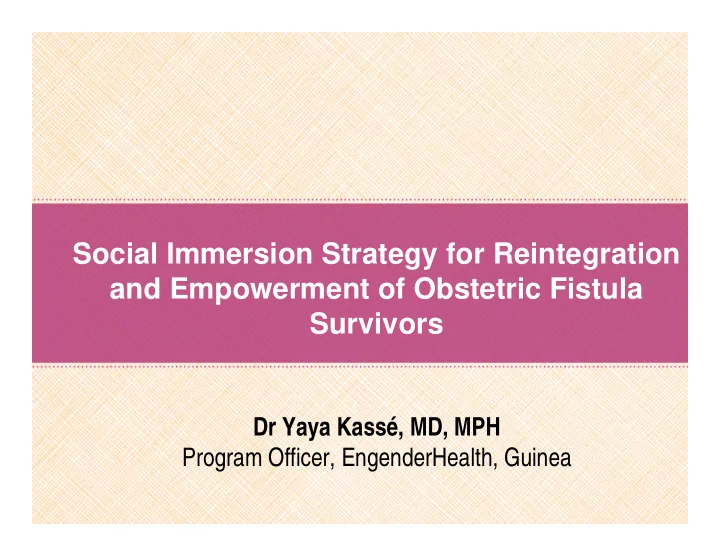

Social Immersion Strategy for Reintegration and Empowerment of Obstetric Fistula Survivors Dr Yaya Kassé, MD, MPH Program Officer, EngenderHealth, Guinea
What is Obstetric Fistula? Obstetric fistula is an injury usually caused by several days of obstructed labor, without timely medical intervention
Root Causes of Obstetric Fistula � Unavailability of quality health services � The burden of transportation � Early childbearing � Poverty � Gender inequality � Poor governance
The Consequences of Obstetric Fistula are life shattering � The baby usually dies, and the woman is left with chronic incontinence. � Women with incontinence are abandoned, neglected by her husband and family and suffer the ostracism of the community. � While surgical repair can physically heal, the psychological trauma of fistula may persist.
Reintegration of fistula survivors The Social Immersion Approach � Qualitative interviews were done with clients at Kissidougou District Hospital in July 2007 to assess their social status before the repair (ie: married or abandoned/living in isolation/poverty issues etc) and how they felt after repair. � The interviews showed that after repair, many women who had undergone profound emotional distress still faced many social challenges. More than physical treatment was needed. � EH partnered with the Urban Development Commune of Kissidougou to find families willing to host repaired clients in their homes to address some of the social issues confronting these women.
Reintegration of fistula survivors The Social Immersion Approach � After discharge, women live on a voluntary basis with local host families for 2 to 3 weeks � The host families provide the clients with • Social support: welcoming women in the homes as a member of the family • Convalescence (the women are allowed to rest, although many participate in small tasks with the other women in the household because they enjoy it, such as cooking) • Social acceptance (including the women in their family events such as weddings and baptisms, ceremonies in the mosque)
Reintegration of fistula survivor The Social Immersion Approach � Ninety-six (96) women (out of 214) have benefitted from the social immersion (July 2008- June 2009) � Some clients have stayed with their host families more than once (i.e. if they required multiple surgeries) � Some families hosted clients before they became integrated into the program-- true grassroots initiative
Reintegration of fistula survivors In addition to the support provided by the host family, women are reinforced in knowledge and behavior change during the social immersion period by program staff Women gain knowledge on causes and prevention of fistula, • what to do if they get pregnant and where treatment is available Women receive orientation in interpersonal • communication skills to share their new knowledge Selected women volunteer to provide awareness • raising sessions at community social events (baptism, wedding ceremonies)
The Social Immersion Approach The Client as an Agent of Change � When they return to their home communities, many women have conducted awareness raising sessions in their communities to advocate for those without a voice � From July 2008-June 2009 • Approximately 39% women who have participated in social immersion have conducted an awareness raising session (n=37) • Most of these women have conducted more than 1 session (sessions=53) • 1230 people have attended these sessions
The Social Immersion Approach The Community as Agent of Change Host families are thanked by government officials during field visits covered by local rural radio � 25 health talks have been emitted by the local radio of Kissidougou reinforcing the clients advocating in the community and raising community awareness. The local radio: Reinforces community sense of humanitarianism • Raises visibility of fistula and community involvement • � Recognition in the community is an incentive to host families • Host families are not paid or compensated in any way for their participation • Most have hosted clients more than once and all said they would do it again. In doing so, they fulfill religious obligations
The Social Immersion Approach The Deputy Mayor of Kissidougou, accompanied by a rural radio broadcaster, visits fistula clients and their host families.
Lessons Learned 1. Fistula survivors who participate in the social immersion program demonstrate improved confidence and regain their self-esteem: speaking out publically; reaching out to other women; acting as community agents of change. 2. The social immersion approach improves links between the fistula repair facility and the surrounding community : community members act as agents of change, reduce stigma; refer to the hospital; reduce burden of prolonged hospitalization . 3. An effective fistula care program should go beyond urinary continence to address emotional and psychosocial problems 4. Strategic alliances with the community have been critical to making this approach work: coordination through the Urban Development Commune; use of local radio 5. The provision with IEC materials on fistula causes and prevention to host families has been instrumental to the success of the approach. 6. Local radio intervention was critical to raise awareness and get more families involved in the program
THANK YOU FOR YOUR ATTENTION
Recommend
More recommend